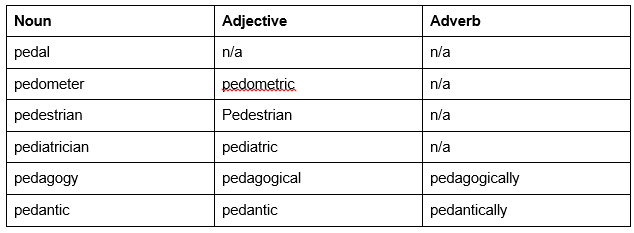Pedometer. Pediatrician. Pedal. Pedagogy. Pedestrian. What do all these words have in common? Unfortunately, the obvious answer isn’t quite correct. Although all these words contain “ped-,” they actually come from two different roots that, by an unhappy accident, are identical in most circumstances. The Latin “ped-” means “foot;” the Greek “ped-” means “child.” Depending on the dialect of English you’ve studied, you may or may not have encountered this problem. Sometimes, for example, in UK English, the Greek root is spelled “paed,” which eliminates the confusion altogether. Alas, we Americans are not so kind, so you’ll have to either learn all the words that use this root individually, or you’ll have to learn to recognize Greek or Latin roots that are often combined with “ped-” in order to decide which meaning of the root is being used.
The Latin “Ped-” Means Foot
It’s not too hard to remember this meaning because of the word pedal. That’s the part of a car or bike where you press your foot to go and stop. A pedometer is a device that measures the number of steps you take or the distance you walk. A pedestrian is a person who is traveling on foot, as opposed to by transport. At many intersections, you can see “Pedestrian Xing,” zones, (“xing” is short for “crossing”), known in some places as “zebra crossings.”
The Greek “Ped-” Means Child
You may have heard the word pediatrician, a doctor who treats only children. Pedagogy combines “ped-” with “gog-”, another Greek root that has to do with leadership. So pedagogy is the leading of children or, less literally, teaching. Pedantic has similar etymology: it refers to a nitpicky or overly detailed teacher. In common usage, someone who adheres to rules or requires the same adherance from others even when it’s really unnecessary could be described as pedantic.
Other parts of speech
Above I have given you the forms of these words that you’re most likely to encounter in your reading or listening. But you will sometimes run into a less common form. Check out the table below to get a quick overview of less common forms of the words I discussed in this blog.







Leave a Reply